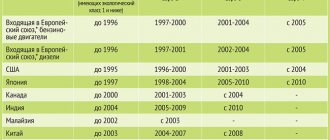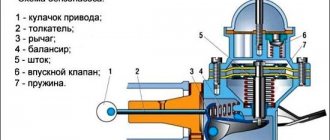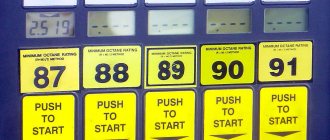For a long time now, at gas stations with well-known names, the range of fuel is not limited to only three types: 92, 95 and 98. Gasoline appears with the prefixes “EKTO” and “ultimate”. Known all over the world, it also recently released its version of the “ideal” fuel. You can read about what EKTO 100 from Lukoil is and what machines it is intended for in this article.
– Russian oil tycoon
When people talk about, the red and white color scheme and the icon in the form of a drop of oil immediately appear before their eyes. The company, founded in 1991, back in the USSR, is the largest Russian oil company. Every city has at least one gas station of this brand; on every major highway you can see the friendly lights of this gas station along the way. The Lukoil brand is loved by drivers for its reliability and the latest developments. Every year, the company's engineers develop and improve their product, helping motorists keep their cars in good condition, kilometer after kilometer. Lukoil works on an equal basis with Western manufacturers, adhering to European quality standards. All gasoline sold at branded gas stations complies with the Euro-5 protocol. Not only is it a product of the highest quality, but it also preserves the environment by emitting fewer harmful substances during combustion.
A look into the future
No sooner had the fifth-generation product appeared on sale than journalists became interested: are there already developments on new types of diesel engines of the sixth and subsequent quality levels? Should we expect new cars with even more advanced, economical and environmentally friendly engines? According to chemists, in the coming years, a fundamental change in the composition of diesel fuel, which would allow us to talk about the emergence of a “diesel” of a new standard, is not expected. Accordingly, the Lukoil product EKTO Diesel, whose passport complies with the fifth generation standards, like its analogues, will de facto dominate the market for the next decade.
Oil refiners have stopped at the line, beyond which it is the task of the science of the future. But there is no limit to perfection. Scientists are working to improve certain qualities of diesel fuel. In the near future, the environmental friendliness of diesel fuel throughout the world will obviously only be improved by introducing new methods for more complete removal of polycyclic aromatic hydrocarbons. And in order to cause even less harm to the environment, diesel engines must be improved at the same time.
View gallery
Fuel of the future
With the development of modern technologies, the requirements for fuel are also increasing. The driver of a new Mercedes or BMW will not fill up with 92 gasoline, but will stop at a well-known gas station and choose the best product. Such a product was the EKTO series fuel. The name can be deciphered as “eco-friendly fuel”. The combination is somewhat contradictory to itself - is gasoline ever environmentally friendly? Yes and no. This gasoline produces fewer combustion products than regular gasoline and complies with Euro-5 standards. This is an environmental standard that regulates the amount of harmful substances in exhaust gases. The toxicity standards for such fuel are much better than for conventional fuel. Emissions of dioxides and hydrocarbons are reduced, which means they cause less harm. Modern cars, starting from 2009, have Euro-5 engines. By refueling with gasoline marked “ECTO” in such a car, you reduce the amount of exhaust gases released into the atmosphere. But for the cars themselves, the benefits of “EKTO” gasoline are obvious: it cleans the car engine of contaminants and generally improves performance, helping the owner to drive longer without breakdowns.
A little about the tests carried out
We are not the first to be interested in the question of whether there is a difference between 95 and 95 improved. A couple of years ago in Russia, tests of both brands of gasoline were already carried out, which were taken from gas stations of various companies, both domestic and foreign. The results of these tests were predictable. As tests have shown, the promised increase in power from the improved 95-octane gasoline was never noticed. An ultra-precise stand for determining engine power recorded approximately the same indicators, with a difference of 0.5 -1%. So, the first answer is that improved gasoline will definitely not add power to your car.
Approximately the same situation is with. Let us remind you that the manufacturer promises a reduction in consumption using 95+ gasoline. However, during real tests it was discovered that fuel economy is nothing more than empty promises.
“What is the difference between 95+ gasoline then,” you ask? Is there any point in overpaying for it?
To some extent, yes. The fact is that when conducting chemical analyzes on the composition of the fuel, both types of fuel corresponded to the same octane number, but the improved 95-gasoline was found to contain flushing additives that do a good job of cleaning the injectors from carbon deposits. As is known, the engine response and its dynamics depend on the degree of contamination of the injectors. In other words, gasoline 95 Ecto, or any other improved one, has a gentle effect and removes carbon deposits from the inside throughout the entire fuel system.
And most importantly, should I buy improved 95-octane gasoline or not?
At a minimum, periodic refueling with 95+ gasoline will not be superfluous. If you have a new car, then the benefits of such gasoline will be much greater, since during break-in the engine will operate in even more gentle conditions. As for domestically produced cars, or old ones, this is a moot point. It is clear that you should not expect significant results from refueling with 95+ gasoline, but as a preventive measure, it will be quite useful to pamper your car and rid it of soot a little.
12.04.2016
Fuel quality has always been the “Achilles heel” of the domestic oil refining industry. Many factories simply do not meet European requirements, releasing fuel to the market that is not always of the best quality. At the same time, many different brands of fuel appear at gas stations, which even an experienced car enthusiast can get confused about. Let's figure out why EKTO gasoline is so special, and how it differs from the more popular Euro. At the same time, we will answer the main question of car enthusiasts, which of these gasolines is better.
"Ecto 100" from Lukoil: history of appearance
On April 20, 2006, it introduced a new line of fuel labeled “EKTO”. The first names were “EKTO 92” and “EKTO 95”, which met Euro-3 quality standards and at that time exceeded state standards. At first, people were distrustful of the new product. The advantages of the fuel could be “tasted” only after long-term operation. But since the price of EKTO gasoline was the same as regular gasoline, drivers gradually switched to it. In the long term, the fuel performed well, and many motorists began to buy only it.
received all the necessary quality certificates and is now the sole supplier of gasoline marked “EKTO”. Branded fuel shows its best side, which is why many motorists specially stop only at Lukoil gas stations to fill up their car with branded gasoline. After EKTO 98, EKTO 100 gasoline has recently gone on sale. And if everything was clear with the previous names, then the number “one hundred” in the name leads many to bewilderment. How does this type of gasoline differ from the previous ones and does it make sense to switch to it from 98?
Which gasoline is better, EKTO or Euro?
Having tested ECTO 95 and Euro 95 gasoline (what is the difference and which is better), users came to the conclusion: for new cars, the first option is preferable, and for old vehicles with high mileage, the second type of fuel is more suitable.
In the case when a driver wants to switch to a Lukoil product, it is recommended to “accustom” his car to it gradually: add environmentally friendly gasoline to the usual one and observe how the vehicle behaves.
It is recommended to use ECTO for preventive flushing of engines, but often refueling an old car with it, the owner risks breaking it. Experts do not recommend refueling a car with a two-stroke engine with Lukoil EKTO, since in this case the fuel will not show any benefits.
Fuel characteristics
Many drivers are of the mistaken opinion that Lukoil fuel EKTO 100 is simply an improved version of EKTO 98. However, the compositions of the products are fundamentally different from each other. The new, 100th fuel has radically changed the recipe and manufacturing methods. It is wrong to assume that an octane number of 100 units is achieved with just one set of additives. The matter here is much more complicated. This result is achieved using a component of gasoline - alkylate. It gives a high octane number, pollutes the car engine less and releases less exhaust gases into the atmosphere. Alkylate increases machine power by increasing air flow to the internal combustion engine.
The EKTO line of gasolines is notable for the fact that it contains much fewer harmful components. The amount of sulfur in them is reduced by 3 times, benzene by 5. The cleaning properties of Lukoil fuel have long been known to drivers. Characteristics of EKTO 100 from Lukoil include:
- Cleaning properties: cleans the engine of accumulated deposits.
- Protection of the engine from corrosion.
- Reducing the amount of deposits.
- Maintaining the spraying ability of injectors.
The use of EKTO series fuel helps to increase the service life of the vehicle due to reduced system wear, increased engine power and detergent additives. In addition, 100th gasoline helps to save both on consumption and on car maintenance. Compared to EKTO 98, the new version of the fuel gives attractive figures:
- Engine power increases by 10 percent.
- Fuel consumption is reduced by 6 percent.
- Acceleration dynamics increase by 7%.
Agree, not bad indicators? The Lukoil brand is proud of its new product. And positive reviews about EKTO 100 from Lukoil only prove its competitive qualities.
Improving the characteristics of EKTO Diesel (Lukoil)
Reviews from motorists about the use of fifth-generation diesel engines indicate that a number of drivers are concerned about the very low sulfur concentration. It is known, and experts confirm this, that sulfur and its compounds, present in large quantities in previous diesel fuel, played the role of a kind of lubricant in the engine cylinders.
This property of the mentioned substance is also known to Russian petrochemists. As they say, every cloud has a silver lining: sulfur compounds turned out to be useful in at least some way. Only this benefit was offset by the harmful effects on other engine systems and on the surrounding environment. EKTO diesel fuel (Euro-5) contains almost no sulfur. Instead, Lukoil used a specially developed and tested complex of additives that provide an excellent lubrication effect.
View gallery
Lukoil: EKTO 98
EKTO 98 was the first fuel developed specifically for highly accelerated engines. Having switched to branded 98-grade gasoline from Lukoil, owners of sports cars immediately noticed a difference in the performance of car parts. The car held speed better, drove smoother, and consumed less fuel. EKTO 98 was the first gasoline with such a high octane number. Compliant with Euro-5 standards, it has a special set of detergent additives that clean the engine of contaminants and have reduced emissions of harmful substances and differs from AI-98 in several respects:
- Higher density.
- Increase in octane number by 0.5-1%.
- Less calorie content, but more oxygen, which means more power.
201110281734_no_copyright_bp_bak_2
Is it worth overpaying for fuel with the Ultimate or Ecto prefixes? How valid are the company's promises to increase power by up to 14.7%, increase acceleration to 9.9%, or reduce engine corrosion to zero?
To answer such questions, we purchased samples of BP and Lukoil gasoline with octane numbers of 95 and 98 at branded gas stations in the capital - six samples in total.
By definition, the purchased gasoline had to be of the required quality - otherwise any comparisons between “Ecto” and “not Ecto” lose their meaning. And so it turned out: checking the physical and chemical parameters of the purchased fuel did not reveal any surprises. Everything is in order, the current GOSTs are satisfied. Octane numbers are even above the norm, resins are low.
Judging by the statements of fuel manufacturers, Ecto and Ultimate gasolines contain detergent additives. How effectively do they work and what can you expect from it?
The standard test for the detergency of gasoline is very long and labor-intensive, but we will go our own way. Let's try to evaluate the trend itself in terms of changes in the amount of deposits when the engine runs on gasoline with detergent additives, and at the same time check how the engine will react to this.
For which cars is it intended?
For modern motorists, it has become a common situation when, when visiting a gas station, they see both 98 and 100 gasoline on sale, along with 92 and 95. Such numbers no longer cause bewilderment; moreover, every second motorist fills them up. But is this correct and is it possible to accidentally damage your car? For which cars is EKTO 100 fuel from Lukoil suitable? The manufacturer recommends pouring products with such a high octane number only into the engines of powerful or sports cars, the instructions for which show gasoline with such indicators. Why doesn’t it make sense to fill the 100th EKTO into some VAZ-2107 or Matiz? Highly accelerated engines, which are found in most modern cars, have a small volume and at the same time increased power. They are initially designed to use fuel with a high octane number, so there is a clear answer to the question “for which cars is Lukoil EKTO 100 suitable?”
If you really want to try the hundredth gasoline in practice, but the engine of your car is the most ordinary, then you can do the following. Fill in 10-15 liters of regular fuel, and add 5-10 with a higher octane number on top. This way you will raise the average without harming the engine.
Here is a small list of examples of which cars EKTO 100 gasoline from Lukoil is best suited for:
- Chevrolet Corvette;
- Nissan Skyline;
- Jaguar;
- Mazda, racing models;
- Mercedes Benz;
- BMW.
With other cars you should be extremely careful and check with the manufacturer before refueling.
Reviews of 100 Ecto from Lukoil
Here are the reviews left by people who refuel with Ecto 100 gasoline from Lukoil.
Boris . “The 100th” from Lukoil is an excellent alternative to the AI 98. The car just flies on the highway, no suspicious noises or rattles. Lukoil is generally an excellent manufacturer; I personally like it much more than Neftmagistral or Gazpromneft. By the way, details about entering your Gazpromneft GPN Card personal account.
Oleg . I dilute Ecto 92 gasoline. I started doing this not so long ago, but the difference is already noticeable. I have a domestic car - VAZ 99, produced in 2001. Of course, it broke down constantly, then one thing had to be changed, then another. The additive from AI 100 has changed a lot, the engine has become quieter, I change the oil and spark plugs much less often. I recommend it to everyone, if you use Sotka as an additive, it won’t hurt your pocket too much, but on the contrary, it will save money on repairs and nerves for the owner
Maksim. Modern cars dictate a new approach to fuel selection. I have been filling up with Ecto 100 since it first appeared at gas stations. The car's spark plugs are clean, without carbon deposits, less fuel is consumed - this is really noticeable. By the way, this fuel causes less harm to the environment; this fact should also not be ignored. Owner of Mazda CX-5.
Ivan. I refueled the 95 with a consumption of 12 liters on a 200 horsepower engine, I started refueling the Sotka, the consumption dropped to 11 liters. From the point of view of benefits, this and that, but: the spark plugs are clean, the exhaust is more environmentally friendly, in the north of the region it can be -35, I start better than anyone.
Interesting review about 100 gasoline from an engine expert.
“The octane number of gasoline is related to the compression ratio of the engine, and today’s engines most often have a compression ratio of 10 or higher. It is better to fill such cars with AI 98, ideally 100, but not lower.
The fact is that if you pour AI 92 or 95 into such cars, the shock load on the power unit will increase, and your parts will wear out faster. If we are talking about turbo engines, then it is better to use the same 98 or 100, because resistance to detonation directly depends on the octane number. The issue concerns engine safety, so there is no choice. In addition, the air-fuel mixture burns longer, i.e. the turbine forces air into the cylinder and less than 100% of gasoline is required for similar work, which reduces consumption and load, increasing productivity.
It’s not worth filling in 92, now I’ll explain why. The engines of modern cars are equipped with anti-knock sensors, which begin to function only after detonation. In other words, when the mixture burns and knocks in the cylinder.
So you can safely pour 100 into an ordinary modern engine (especially with a turbine), since only it will ensure long-term operation of the power unit and clean the carbon from elements that have suffered from 92 or other low-quality gasoline, and the consumption will decrease by 100 km.
Now let's look at the performance characteristics of, for example, Polo or Soryaris:
Polo 1.6 - compression ratio 10.5;
Solaris 1.6 - 11;
Solaris 1.4 - 10.5.
Is it worth talking about others? That's it. I’m sure there’s something to think about here.”
Refills . Here are the addresses of some Lukoil gas stations in Moscow where you can buy AI 100 gasoline:
- Varshavskoe highway, ow. 24a
- Vernadskogo Avenue, building 3a
- Andropov Avenue, Vl. 22/30A
- st. Tamanskaya, building 5
- Volokolamskoye Highway, 140
Full information on gas stations can be found here, in the section: Map of Lukoil gas stations.
Source: lukoilazs.ru
Advantages and disadvantages according to driver reviews
Reviews of EKTO 100 from Lukoil are extremely contradictory. Anyone can be confused by the different opinions about this fuel. The question immediately arises in my head about which cars EKTO 100 (Lukoil) is suitable for. Like every product in the world, new gasoline has its own advantages and disadvantages, which are offset by knowledge of your car and the characteristics of the fuel. So, what are the positive characteristics?
- Reduced fuel consumption by 6-8 percent. Although 100-grade gasoline costs slightly more than 98-grade gasoline, when all factors are taken into account, this difference will disappear over time due to a decrease in the amount of gasoline consumed. Therefore, despite the price, filling up with the hundredth gasoline will not affect your wallet, and will also save money on car repairs.
- Increased launch and movement efficiency. Due to the improved injection and fuel supply system, the car starts faster and acceleration time is reduced.
- The car becomes more “sensitive” to the gas pedal, traction at high speeds on 100-octane gasoline is excellent.
- To maintain high speeds on highways, you have to press less on the gas pedal, which means fuel consumption is reduced and engine life is increased.
- The engine becomes more flexible and allows you to perform complex maneuvers on the roads.
This is an impressive list of advantages for those who use EKTO 100 fuel from Lukoil. What could be the disadvantages here? Unfortunately, using gasoline for the wrong purposes can significantly damage the “karma” of the product. But the reason for this will not be poor quality, but the ignorance of the buyer. What disadvantages does EKTO 100 fuel have?
- Detergent additives that are good for high-performance engines can have a negative effect on regular ones. The fact is that if in new machines, whose service life does not exceed 3 years, serious contaminants have not yet been deposited, then in old ones no additives will be able to clean all the accumulated slag. By the way, it is for this reason that the manufacturer recommends changing the fuel filter after 50 km of driving on “new” gasoline.
- Increased air flow can easily increase the temperature in parts that are simply not adapted to such loads. As a result, the power unit may fail.
- Instead of reducing fuel consumption in conventional cars, you may experience the opposite effect.
Reviews of EKTO 100 gasoline from Lukoil indicate that when used in economy-class cars with medium and low power ratings, EKTO 100 not only does not live up to its characteristics, but can also ruin the car in the long run. But drivers are satisfied with its use in powerful modern cars; they note improved engine performance and reduced fuel consumption. The question of whether it is possible to fill EKTO 100 from Lukoil into your car is decided by each driver independently, and this must be approached with full responsibility.
What is Euro?
Euro is one of the environmental standards adopted in the European Union. It characterizes the volume of harmful substances in burnt (exhaust) gases. Previously, this parameter was not given much importance, but over the past 20 years, humanity has been actively concerned about the future of the planet and is trying with all its might to reduce the volume of harmful emissions into the atmosphere. One of the ways is to increase the requirements for the composition of the exhaust and, accordingly, the quality of gasoline.
The timing of the new standards is as follows:
- since 1992, the first Euro-1 standard was introduced;
- in 1996 - Euro-2;
- Euro-3 appeared in 2000;
- will introduce Euro-4 in 2005;
- in 2008 - Euro-5.
With each generation of the Euro, the requirements for the content of harmful substances in exhaust gases and the sulfur content in gasoline became stricter. For example, in Euro-3 fuel the sulfur content should not exceed 150 mg/kg, while in the previous version (Euro-2) this figure could be at the level of 500 mg/kg. In addition, Euro-3 has a number of positive qualities:
- low level of aromatic carbohydrates - up to 42%;
- mass fraction of oxygen - no more than 2.7%;
- part of oxygenates - up to 15%.
Despite the fact that the Euro-3 standard appeared at the beginning of 2000, Russia did not keep up with the new requirements. Only at the beginning of 2013 was a complete transition to Euro 3 carried out. The main characteristics of this class include:
- cetane index - from 46;
- cetane number - 51;
- sulfur content - up to 350 mg/kg;
- flash point - 55 degrees Celsius;
- water content - up to 200 mg/kg and so on.
All these standards mean little to the average car enthusiast. To understand the features of Euro and its main differences from regular gasoline, it is worth considering the following points:
- Benzene.
The toxicity of not only the fuel, but also the vapors of already burnt fuel depends on the level of benzene. In addition, a large volume of benzene leads to the appearance of carbon deposits in the engine, which negatively affects the life of the power unit. According to current standards, modern Euro class fuel should contain up to 1% benzene, although previously up to 5% was allowed.
- Sulfur.
The lower the sulfur content in the fuel, the better. It's easy to explain. During combustion, the process of sulfur oxidation occurs. As a result, sulfuric and sulfurous acids are formed, which negatively affect the operation of the power unit. Old engines are not afraid of such problems, but new ones have an aluminum cylinder block, which is sensitive to such effects. As a result, the engine resource is reduced. In addition, catalysts and exhaust systems quickly fail, which subsequently requires additional costs from the car owner. As for Euro-3, it should contain up to 150 mg/kg of sulfur. Further is better. For Euro-4 fuel this figure should not be higher than 50 mg/kg, and for Euro-5 - up to 10 mg/kg. Unfortunately, domestic refineries are still very far from meeting these parameters.
- Aromatics.
An important point is aromatic hydrocarbons, which affect the increase in octane number, but increase the formation of soot. In addition, they can negatively affect the plastic and rubber elements of the car. Do not forget that these hydrocarbons are inherently solvents, so a number of elements are affected - tubes, seals, filters, and so on.
- Octane number.
Gasoline, which has a low octane number, burns extremely quickly in modern engines with a high compression ratio. This feature leads to detonation and a decrease in the resource of the power unit. As a result, engine wear increases, its smoke level increases, valves burn, the integrity of the piston system is compromised, and so on.
Many car enthusiasts thoughtlessly fill up with the latest brands of fuel, hoping to squeeze something new out of their car. As a result, they get not additional power, but new problems. The reason is that when choosing fuel, you should follow the manufacturer’s recommendations rather than modern standards. For example, for old VAZs, the more “ancient” Euro standards are also perfect. As for new foreign cars, for them the transition to Euro-3 or higher quality fuel will be more relevant.
It is important to take into account the features of the engine. If it is designed for Euro-2, then pouring “four” or “five” into it can “burn” the catalyst or lambda probe. As a result, you will have to spend a lot of money to replace failed components. Moderation is important in everything. It is also worth considering that local fuel so far only meets Euro-3 standards (at best). If you come across Euro-4 or Euro-5 fuel at a gas station, it was imported from abroad, which inevitably affects the cost.
Comparative analysis with other brands
Modern oil companies constantly compete with each other, producing equivalent products. How do they differ from each other and are they different at all? This can be understood by studying reviews and comparative tests of various brands.
The main competitors of EKTO 100 fuel from Lukoil are BP Ultimate and Shell with their V-Power Racing line. How are they different and how are they similar? If we compare EKTO 100 TSI from Lukoil with BP Ultimate, the tests will show the same octane number for both brands. The calorie content of the fuel is also approximately the same. But the complex of additives in EKTO 100 is much simpler than in Ultimate. All other things being equal, BP Ultimate gasoline has a slight advantage.
When comparing Lukoil fuel with Shell's high-octane racing fuel line, the differences are more obvious. V-Power Racing is inferior to EKTO 100 by 0.5% of the octane number. In other respects, on the contrary, he surpasses him. Shell is the record holder for density; the calorie content of the fuel is 1.5 times higher than Lukoil! The multifunctional set of additives is 2 times more diverse and better than in EKTO. It is thanks to these indicators that motorists, when they encounter a Shell gas station on their way, refuel at it.
But still, the differences between brands are only a fraction of a percent, and the difference with long-term use of high-octane fuel will not be so noticeable.
Ecological points
ECTO includes three times less sulfur, and five times less benzene! All this will make it possible to significantly reduce harmful emissions into the atmosphere (carcinogens, sulfur combinations) as part of the fight for a clean environment. Environmentally friendly additives are added to the base fuel, thereby adjusting it to standards. By the way, the presence of these additives is a prerequisite for European types of fuel: gasoline, diesel. So Euro-4 diesel fuel, for example, takes care of the corresponding engines.
It is also suitable for older domestic equipment: tractors, combines. When used, ignition improves and service life increases. A sustainable cleaning effect is observed for the entire fuel and engine unit of transport. Euro reduces fuel costs by up to 4%, and the oil needs to be changed half as often.
Price of EKTO 100 fuel
If we have figured out what kind of fuel “EKTO 100” from Lukoil is, then it’s time to move directly to the price of this product. When new gasoline appeared on the market, its price was equal to the previous “version” with number 98. But now, as motorists learn and switch to EKTO 100, the price is changing. Here are comparative prices for Lukoil brand gasoline in different cities. In St. Petersburg, in order to fill up with high-quality gasoline, you will need from 40 to 48 rubles per liter. AI-98 costs approximately 42 rubles/liter, AI-100 is 1-2 rubles more expensive. In Moscow, the cost of fuel will differ slightly by 1-2 rubles. It is worth noting that not every city can find a Lukoil gas station with EKTO 100. Despite the difference in price, many drivers claim that using AI-100 is even more economical. Why?
Lukoil prices today. Prices for gasoline and diesel fuel Lukoil
We present you the price table for Lukoil today 18.01.2020.
Please note that these are the average prices for AI-92, AI-95, AI-98 gasoline and diesel fuel in the largest cities of Russia today. Data is taken from various sources, incl. from residents of different cities of Russia.
| City | AI-92 | 95 Ecto | 95 Euro | 98 Ecto | Ecto 100 | Dt |
| Moscow | 44,16 | 48,24 | 49,25 | 54,29 | 55,28 | 46,52 |
| Saint Petersburg | 43,40 | 47,69 | 46,49 | 53,29 | 54,84 | 47,41 |
| Novosibirsk | 42,35 | 45,45 | 44,55 | 50,80 | 51,80 | 47,80 |
| Ekaterinburg | 42,35 | 46,15 | 45,75 | 52,91 | 53,96 | 46,55 |
| Nizhny Novgorod | 42,63 | 46,00 | 45,80 | 51,56 | 53,59 | 45,96 |
| Kazan | 42,00 | 44,60 | 45,65 | 51,10 | 53,55 | 44,90 |
| Chelyabinsk | 41,60 | 44,85 | 43,95 | 52,77 | 55,27 | 47,30 |
| Saransk | 42,35 | 46,15 | 45,75 | 52,91 | 53,96 | 46,55 |
| Omsk | 42,20 | 44,65 | 44,20 | 52,87 | 56,42 | 46,55 |
| Samara | 41,95 | 46,10 | 45,00 | 52,67 | 55,42 | 44,75 |
| Rostov-on-Don | 44,19 | 47,67 | 46,77 | 54,27 | 56,72 | 45,50 |
| Ufa | 42,05 | 45,00 | 43,80 | 49,20 | 51,95 | 45,85 |
| Permian | 43,64 | 46,80 | 46,35 | 52,78 | 55,18 | 46,85 |
| Voronezh | 43,90 | 47,75 | 46,70 | 51,40 | 54,85 | 46,05 |
| Volgograd | 43,45 | 47,29 | 46,29 | 51,86 | 54,21 | 46,01 |
How to get 10% cashback at Lukoil gas stations
If you travel a lot and have to refuel often, apply for a Cash Back credit card from Alfa-Bank. Pay for gas with this card every time and get a REAL 10% cash back on YOUR card! Let us clarify once again - you do not receive any points or bonuses, but real money! You get a 10% refund on gasoline at ANY gas station in Russia, including Lukoil. To apply for a card, follow the link. We recommend that you look at other loan offers from Alfa-Bank.
Please note that our website lukojl-licard.ru is not official. But prices are not published on the official website. Therefore, the presented fuel prices are not 100% reliable. The Lukoil gas station network is very large, numbering hundreds and thousands of stations. Even within the same city, prices for gasoline and diesel fuel differ. Our tables allow you to understand the approximate order of prices for today and for the whole month. A complete map of Lukoil gas stations is available on our website.
Where is fuel cheaper?
In general, if we compare prices for gasoline and diesel fuel at Lukoil with other networks of gas stations, we see not the most pleasant prices. Prices at Lukoil today, and in any other periods, are significantly higher in the vast majority of cases. Pay attention to the highest prices - they are marked in red. Thus, for all brands of fuel the price is noticeably “biting” for the average retail consumer. However, for fuel card holders, prices can be much more interesting due to the discount.
Comparative table of prices at different gas stations
| gas station | AI-92 | AI-95 | AI-98 | Diesel |
| E.K.A. | 42.95 | 46.25 | 51.75 | 44.85 |
| Shell | 42.49 | 46.69 | 50.96 | 45.09 |
| GazpromNeft | 41.9 | 45.8 | 50.6 | 44 |
| Interoil | 43.9 | 45.9 | 50.06 | 44.5 |
| Lukoil | 42.45 | 46.35 | 50.7 | 44.72 |
| Neftmagistral | 42.89 | 45.39 | 49.99 | 44.49 |
| RosNeft | 41.1 | 45.3 | 51 | 43.4 |
| TatNeft | 43.99 | 44.99 | 43.99 | 50.99 |
| TNK | 41.9 | 45.8 | 50.6 | 44 |
| ROUTE | 44.99 | 47.99 | 51.69 | 45.99 |
—
Economical
Thanks to Lukoil's policy, fuel labeled "EKTO" will cost you the same price as regular fuel. Yes, EKTO 100 from Lukoil is slightly more expensive than EKTO 98. But if you make simple calculations, it becomes clear that its use is much more economical. The issue of the financial part is unique for each brand of car, but here is a small example of savings: when refueling AI-100 in Renault Logan with a consumption of approximately 8 liters per 100 kilometers, we will spend 322 rubles for this distance. With a similar amount of AI-98 fuel, refueling will cost 317 rubles. But since “EKTO 100” is 5% more economical, then in terms of conversion it will be 305 rubles for 8 liters of premium gasoline.
So does it make sense to save on your car? After all, high-octane fuel is more profitable in the long term. You just need to calculate how much you will save on engine and car repairs. After all, if EKTO 100 from Lukoil is poured into powerful cars from the very beginning, their engine will retain its original condition for many years. Don't forget this.
How is Ecto different from Euro?
The psychology of a status driver is clear: having a “cool” brand of car, you don’t want to use the services of ordinary gas stations from little-promoted brands. I would like, even if I overpay, to drive on branded gasoline. To evaluate the real advantages of Lukoil Ecto gasoline over conventional brands, comparative tests were carried out. They showed the following:
- The amount of resinous components in Ecto fuel is indeed reduced (relative to the parameters established for Euro-4 gasoline).
- The presence of detergent additives (as declared by the manufacturer) really increases engine power, and is more effective for fuel with a higher octane number. As a result, the toxicity of exhaust is reduced, but only for hydrocarbons: the volume of released nitrogen oxides increases, which is associated with an increase in temperature in the combustion chamber. Euro fuel does not contain detergent additives.
- The efficiency of Ecto fuel from Lukoil increases with the duration of its use. Thus, the presence of detergent additives over time cleanses the engine of accumulated dirt. True, not all brands of imported cars are indifferent to this: in some cases, problems with starting are observed. Over time, these problems disappear.
- The transition to Ecto should be done gradually, after first replacing the fuel filters.
- For cars not equipped with a fuel pre-injection system, there are no differences between Ecto and Euro.
At the same time, the increase in the cost of Ecto fuels in comparison with Euro-4 fuels is not so great.
Gasoline "EKTO 100" from Lukoil: reviews
The new product from Lukoil appeared at gas stations only in June 2017, and many drivers are still wary of it. What do reviews say about EKTO 100 from Lukoil? You can find both good and devastating comments online. On the positive side, drivers note quiet engine operation and improved traction at high and low speeds. The motor stops vibrating and starts sounding quiet and smooth. Motorists also like the improved movement of the car, which responds to the slightest press of the gas pedal. Maintaining high speeds on highways with the new AI-100 fuel has become much easier and more economical. In general, reviews of EKTO 100 from Lukoil are positive. But there are also negative comments in which motorists attach photo evidence of melted candles. A reasonable question arises: “Is the new gasoline from Lukoil that good?”
The whole point is for which machines the EKTO 100 from Lukoil is intended. If a driver does not follow the rules and pours such fuel into a car that does not have a highly boosted engine, he will end up with unpleasant surprises. Sometimes negative reviews about EKTO 100 from Lukoil are associated with the presence of detergent additives in its composition. Dirt accumulated on the engine over several years clogs the fuel filter, which impairs the performance of the car as a whole. That is why the manufacturer recommends replacing this part with a new one after a short mileage. Although AI-100 has a slight negative impact on performance, in the long term Lukoil guarantees improved engine performance. This is an excellent product that is worth the money and will take good care of your car's engine.
Real test
Nothing better characterizes the quality of gasoline than a test on a real car and under normal operating conditions. A 2010 Kia Rio was taken as an “experimental” vehicle. The essence of the experiment was that for several months different types of fuel were alternately used - ECTO and Euro.
The following conclusions can be drawn:
- When using ECTO, the motor runs softer and smoother. Separately, it is worth noting the increase in speed - jerks, jolts and extraneous twitches disappear. The car has an automatic transmission, which worked “a little harshly” when driving in the Euro. During a normal start from a standstill, the car accelerates smoothly, but in the process of overtaking on the highway, when pressing the gas pedal to the floor, additional agility is felt (ECTO additives make themselves felt);
- If you drive an EKTO for a long time and then refuel the Euro car, an additional sound appears from the power unit. In addition, the characteristics of the engine also change - it starts to work faster, an unusual roar appears. Another disadvantage is the gear shift, which becomes noticeable and is transmitted in the form of vibrations throughout the body. It turns out that after refueling the Euro, a certain “twitchiness” and “nervousness” appears in the car;
- When driving non-Euro, the cabin becomes noisier than when filling with ECTO. The far from ideal insulation in the Kia Rio also has its effect. But after filling with EKTO the situation becomes better - the engine noise practically ceases to be audible and begins to merge with the noise from the tires. If you fill in the Euro, the sound appears;
- The use of ECTO helps reduce fuel consumption, albeit slightly. On average, one fuel fill is enough for 50-90 km more. At first glance, this indicator is not serious, but with prolonged use it is definitely noticeable;
- After unscrewing the spark plugs, we can clearly conclude that after ECTO they look cleaner, which allows you to spend money on replacements less often. And problems with fuel ignition in frosty weather do not arise so often.
conclusions
In the USA and Europe, fuel with additives has long been used, which allow car parts to be kept almost in their original form. Although people are still wary of Lukoil’s new product, motorists’ doubts can be easily dispelled in practice.
The use of EKTO 100 gasoline must be approached wisely. For which cars would EKTO 100 from Lukoil be the best option? It is important to remember a simple rule: if your car has a compression ratio greater than 12, then gasoline with such a high octane number will suit you. If from 10-12, then you need to fill the car with 95 gasoline. And if less than 10, then 92nd. Carefully read the information about your car brand, and then there will be no problems with the engine or burnt spark plugs. Correct use of high-octane fuel from Lukoil will help not only extend the life of the engine, but also increase its power and keep it clean for a long time, thanks to an effective set of additives.
Read US on VKontakte
20141113_01
So should you pour cleaning fuel into a “dirty” engine or not? We recommend switching to good things gradually. First, add half a tank of gasoline with a detergent additive to regular fuel, then, when the tank is ¾ full, add good gasoline again. And then only refuel with branded gasoline. We also note that at some stage you will have to change the fuel filter, but this will only be necessary in particularly advanced cases.
So what's the bottom line?
Firstly, branded fuels do have certain advantages over regular ones. This is mainly due to the improved cleaning properties of such gasolines. However, this cannot be seen immediately, but with constant use. But if gasoline is positioned as meeting Euro-3 and higher, then it simply must contain detergent additives.
Secondly, the main advantages of such gasolines still appear on modern injection engines, but they were created for them! The fact is that the jet of fuel from the nozzle in such an engine makes it possible to better use the cleaning properties of additives than in a carburetor. Therefore, the wait for the effect for the “old man” will have to be much longer.
Thirdly, we did not find the declared 14.7% increase in power. But if you use all the opportunities provided by gasoline with higher octane numbers and good cleaning ability, and take something very dirty as a guinea pig, then such figures can be quite real. But we are talking, rather, not about increasing power, but about restoring it.
And finally, fourthly: not so titled gasolines are more expensive than regular ones... Moreover, with the ever-increasing cost of the simplest fuels?
The increasing frequency of natural disasters is the result of human intervention in the ecological balance. The main role in this is played by greenhouse gases, which have led to dramatic climate change. It is not surprising that scientists sounded the alarm and forced the governments of leading countries to pay increased attention to environmental issues, one of the aspects of which is the reduction of emissions of volatile gases. Since the 90s, regulations regarding the tightening of requirements for the composition of automobile emissions began to apply in Europe. This was achieved thanks to the introduction of a whole range of additives into the fuel composition. But since the real impact of the measures taken has been negligible, Euro standards are constantly being edited. Manufacturers of fuel for internal combustion engines are forced to keep up with these requirements, improving the quality of gasoline, primarily from an environmental point of view. But other performance characteristics of automobile fuel are not ignored. Modern additives make it possible to reduce fuel consumption and maximize the service life of power units. Until recently, this process was domestic, but through the efforts of the Lukoil concern, the matter got off the ground.
Reviews
Most reviews from consumers using Lukoil Ecto gasoline note that the figures characterizing the increase in engine power (up to 14.5% or even more) cannot be taken as a serious guideline - it all depends on the condition of the engine and the make of the car. In some cases there is no increase in power at all; there is only a slight restoration of previous indicators compared to those observed when using regular gasoline.
Consumers are also confident that the quality of Ecto fuel is increasing due to the fact that increased quality control standards are established for it. Which is unprovable, since few people can in practice trace the chain of operations of the technological process of gasoline production at any of the enterprises. Placebo effect?
There are quite a lot of warnings that real Ecto gasoline can only be found at branded gas stations, but not at franchise ones.
The cost of Lukoil Ecto gasoline is (lower price for fuel with a lower octane number):
- 43...54 rub/l - at branded gas stations;
- 41...50 rub/l - at regular gas stations located on the highways.
It should be noted that price dynamics vary greatly across Russian regions: this is determined by the logistics of fuel transportation.
Source: avtozhidkost.ru
Gasoline 95 ecto lukoil what is it











